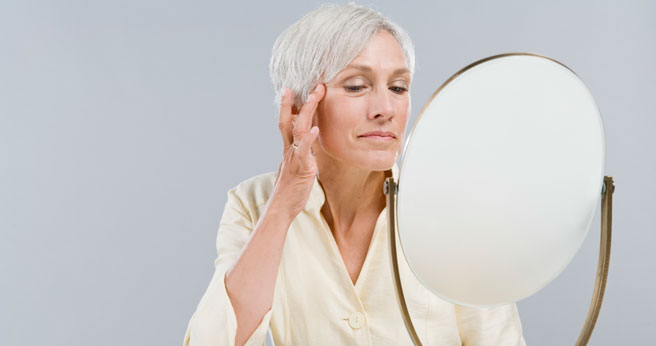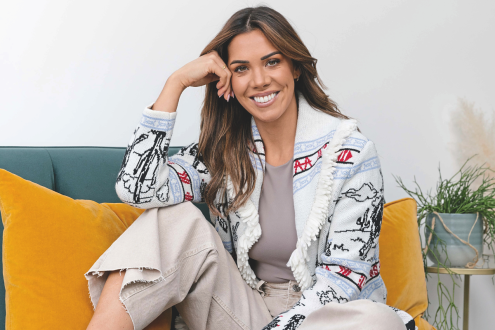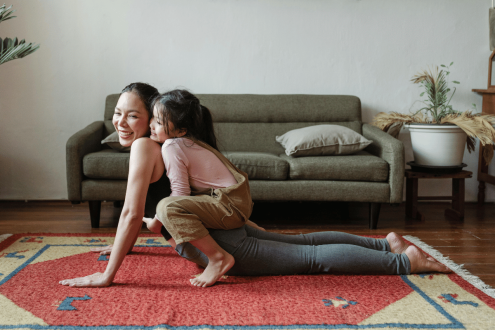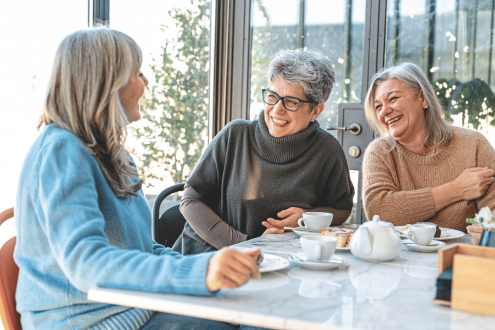Ageing and the body
Marie-Laurence Grézaud discovers ways to embrace the passage of time

One thing is certain: the process of physical ageing no longer means we have to become incapacitated. Age is a way of being and becoming, and no longer a slow process of deterioration. To age with a feeling of wellbeing, remaining active and dynamic, we need to think on a global level, taking stock of the fact that we still have a role to play. The aim is not to reject the passage of time, but to understand the physical and psychological effects of age. Here are different paths to explore.
1 Do some exercise
Forty-five minutes of exercise three times a week or half an hour five times a week reduces the risk of coronary thrombosis, osteoporosis, arthritis and diabetes. By stimulating the immune system, it can also help to defend against certain types of cancers and reduces the chance of cancers returning. ‘Regular physical exercise improves our ability to remember, to plan and to organise. This reduction in the brain’s ageing process could reduce the risk of contracting Alzheimer’s by up to a third,’ says Martine Duclos, head of the sports medicine facility and research at Clermont-Ferrand University Hospital in France.
2 Eat consciously
Change your eating habits in line with the seasons, and eat as naturally as possible. Doing so allows us to protect our bodies and to negate some of the effects of ageing. There are a few simple rules to follow:
• Eat less. Excess weight increases swelling and bloating. This is at the root of oxidative stress and the ageing of our cells.
• Think before having seconds. Avoid having a starter, main course and pudding at every meal and take into account the words of the psychiatrist Gérard Apfeldorfer: ‘Eat according to your hunger, only when you are hungry.’
• Cut down on red meat. Eating a lot of fatty meats (red meat, game, lamb) and processed meat (ham, sausages) raises the risks of certain kinds of cancer – cancer of the colon, the pancreas and even of the prostate. Try to content yourself with eating meat once or twice a week.
• Eat more fish, which is rich in fatty proteins and minerals. It’s a food that’s both good for you (low in cholesterol) and builds up the body’s defences. Choose oily fish such as sardines, salmon and mackerel as these contain the most omega-3. By eating fish two or three times a week, you can halve the risk of getting Alzheimer’s, coronary thrombosis and cerebrovascular problems.
• Eat more fruit and vegetables. They can only be beneficial, reducing the risk of cancer, and helping to preserve brain function. They’re packed full of protective antioxidants (as are herbs and spices).
3 Look after your appearance
The advent of Botox – expensive, painful and addictive – isn’t going to help us age. Knowing that there is a ‘cure’ for the facial signs of ageing is beguiling, but also deeply invidious. The fact that it’s there means we feel we should use it. If we ‘give in’ and let ourselves show our age, we’re letting ourselves down. On the other hand, if there’s a visible sign of age, whether it’s grey hairs or yellow teeth, that makes us feel bad because we no longer look like ourselves. Maybe fixing it can help us feel better about ageing.
‘In my early 40s I began to notice that I looked permanently furious,’ says Catherine, 46. ‘From years of short-sighted squinting and frowning into books, I had acquired deep frown lines. After much soul-searching (without talking to my partner or even my friends, as I knew they would be appalled – or would claim to be) I decided to try Botox on the lines between my brows. The effect was surprisingly good. I no longer looked grumpy all the time. Of course, the problem is you then start looking at the next thing that needs attention. And the expense is awful, but it has helped me get over that demoralising aspect of ageing, when you no longer look how you feel.’
4 Getting through the menopause
Today we live longer, we give birth later and are surrounded by anti-ageing products and treatments, so being in your fifties now is very different from our mothers’ generation. The differences in the way we live for our age, our appearance and our psychological state mean that the arrival of the menopause feels more brutal than it used to, says therapist Marie-Hélène Colson.
Books about the menopause tend to talk about ‘dealing with’ the menopause and ‘surviving’ it. Louise Foxcroft, author of Hot Flushes, Cold Science, points out that taboos about the menopause still hold women in fear. ‘When I was 42, I had an undiagnosed complaint, and a doctor told me I could be peri-menopausal. I was completely shocked by my own response: I was insulted and horrified. I equated menopause with the end of womanhood, of fertility, of being desirable.’
When it was first used, in the 1930s, hormone replacement therapy (HRT) was hailed as an elixir of life. It promised a renewed interest in sex and appealed directly to women’s fears of losing their husband to a younger model. ‘If you’ve got really bad symptoms, HRT will make you feel better, but only temporarily,’ says Foxcroft. ‘And there are well-documented risks.’
‘Less than five years of use doesn’t appear to increase the risk of breast cancer,’ says GP Ann Robinson. ‘It remains the most effective way of dealing with extreme hot flushes, but evidence of HRT’s effectiveness solely for the preservation of youthful looks is much more suspect. Those of us around 50 are clutching at straws, and HRT is one of them.’
We should no longer have to think our femininity depends on fertility. ‘And yet,’ observes Foxcroft, ‘we’re still afraid that ageing women are somehow pointless. Everyone’s proud of being pregnant, and menopause is just another stage in life. I found plenty of information on herbal remedies and diet, but no one was talking about attitudes. The only way we’re going to take that horror out of it is to be more open.’









